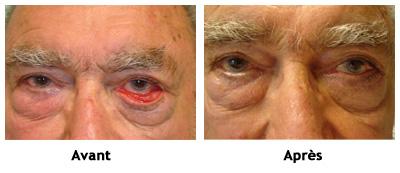Ectropion is a condition in which the lower eyelid turns outward, causing it to no longer fit properly over the eye. This can lead to irritation, dryness of the eye, and an increased risk of infection.

Causes of Ectropion
Ectropion can be caused by several factors:
- Aging: The most common cause is the weakening of the tissues and muscles surrounding the eyelid due to natural aging, causing the eyelid to turn outward.
- Injuries or scars: Injuries or scars to the eyelid can change the normal position of the eyelid and lead to ectropion.
- Neurological Disorders: Conditions such as Bell’s palsy or other paralysis of the facial nerve can cause the eyelid to turn outward.
- Congenital: In some people, ectropion may be present from birth.
- Chronic Inflammation: Long-term inflammation of the eyelid, such as in blepharitis (eyelid inflammation), can also lead to ectropion.
Symptoms of Ectropion
Symptoms of ectropion may include the following:
- Red, irritated eyes
- Excessive tear production (due to the inability of the eyelid to spread the tear film properly)
- Dry eyes and a burning sensation due to the lack of eyelid protection
- Chronic eye infections due to the eyelid not closing completely, which makes the eye more susceptible to bacteria
- Eyelid that turns outward, often visible at the bottom of the eyelid
Treatment of Ectropion
Treatment for ectropion usually focuses on correcting the aesthetic and medical problems caused by the condition:
- Conservative treatment: In less severe cases, artificial tears or ointments may be prescribed to protect the eye and relieve symptoms of irritation.
- Surgery: The most effective treatment is a surgical procedure to reposition the eyelid. This prevents further damage to the eye and improves its cosmetic appearance.
- Treatment of underlying conditions: If the ectropion is caused by an underlying condition such as a neurological disease or chronic inflammation, treating that condition will also help improve the ectropion.
Complications
If left untreated, ectropion can lead to dry eyes, eye infections and corneal damage. In severe cases, this can permanently damage vision. It is therefore important to seek medical help early.